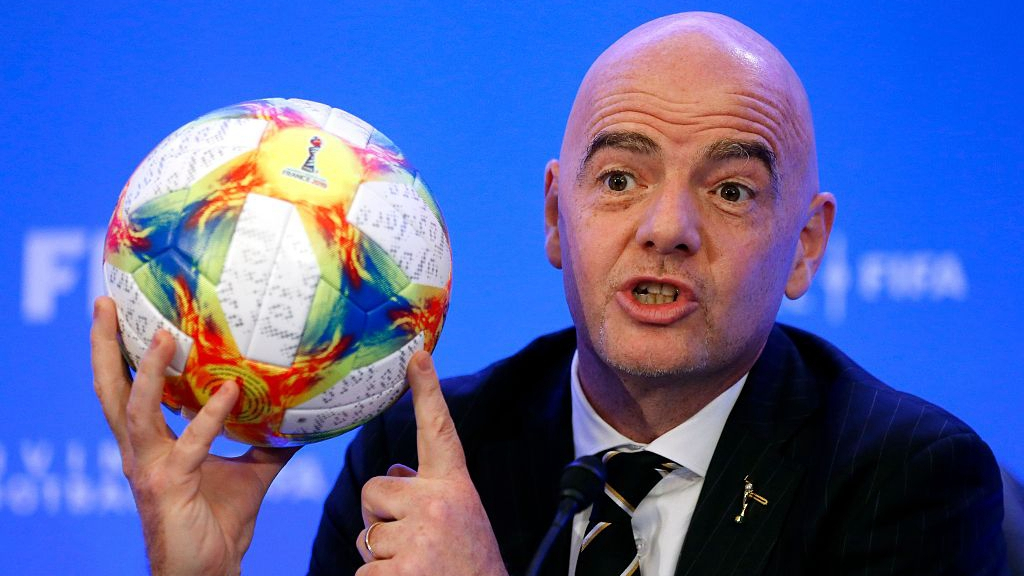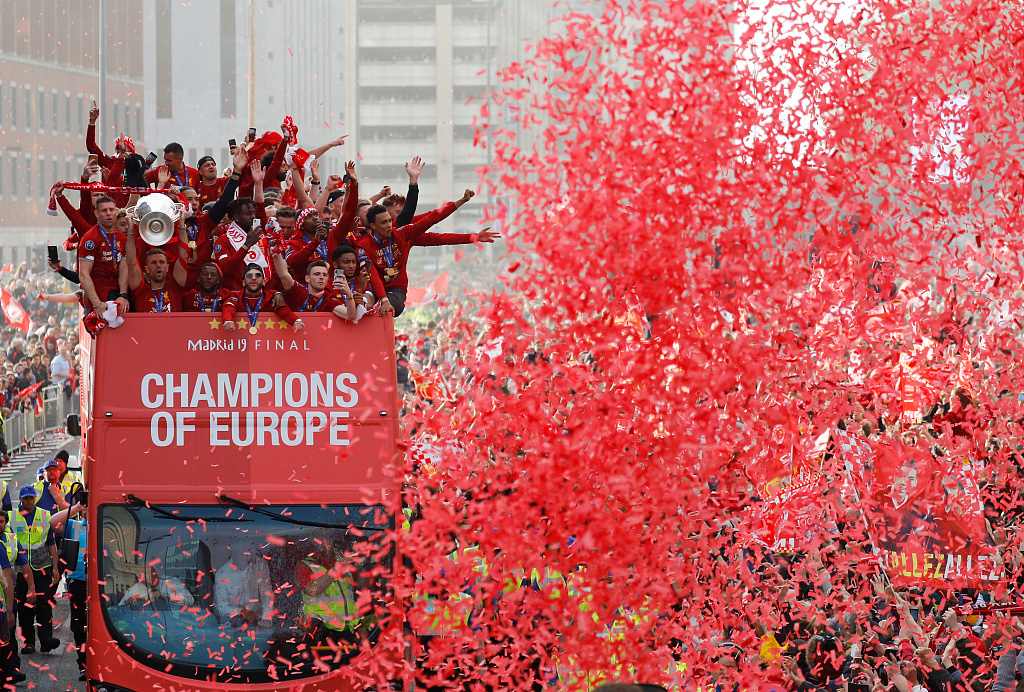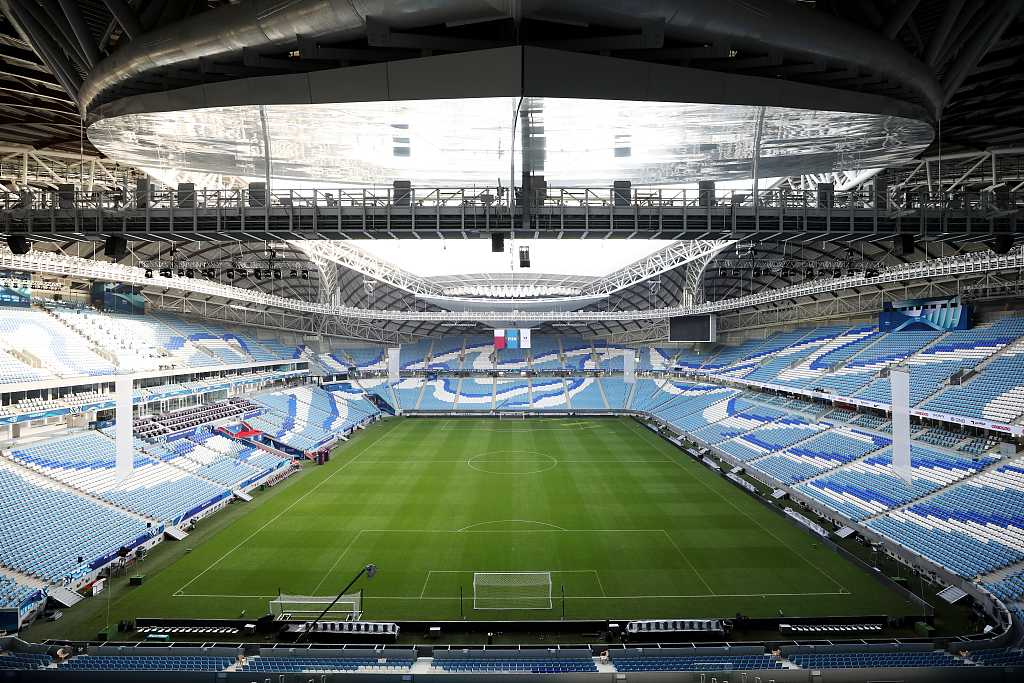
Opinion
17:50, 05-Jun-2019
Infantino's expansion plan is still being challenged
Tracy Chen

Editor's note: Tracy Chen is an assistant research fellow at The School of International Development in the UEA. The article reflects the author's views, and not necessarily those of CGTN.
Among all the successive presidents of FIFA, regardless of reputation and contribution, Gianni Infantino maybe the weakest when talking about authority in the soccer world. But at present, there is no other strong and clear-minded challengers to clean up the mess left by Sepp Blatter who stepped down in 2015 after the corruption crisis. In the upcoming annual FIFA congress in Paris, Gianni Infantino is set to be re-elected as FIFA president, since FIFA confirmed in February that he was the sole candidate for the position.
Since his first term, Infantino has always been a strong advocate of making the World Cup a bigger one. His first major reform then was to increase the World Cup from 32 to 48 teams from 2026 onwards. The FIFA Council easily passed it in less than one year after Infantino's first election in 2016.
By inviting 16 more teams to the feast, more games will be played and this means FIFA will earn more revenue because of more hours of TV exposure for sponsors in the same 32-day tournament period.
But it's not enough for Infantino. In October 2018, he proposed to bring the expansion forward to 2022. Though Qatar made it clear that it was open-minded about the expansion, the hosting country has only three and a half years to go until kick off and its preparing work has been for a 32-team FIFA World Cup. FIFA then conducted a study and found that it was difficult for Qatar to host the event with 16 more teams on its own.

Liverpool's team bus travels past fans during the parade after claiming Champions League title in Liverpool, UK, June 2, 2019. /VCG Photo
Liverpool's team bus travels past fans during the parade after claiming Champions League title in Liverpool, UK, June 2, 2019. /VCG Photo
The possible solution was to require Qatar to share hosting duties with other countries in the region. But considering the present diplomatic and economic standoff between Qatar and a number of its Gulf neighbors, Infantino's audacious plan was difficult to be carried out.
The choices left were Oman and Kuwait. These two countries would be required to spend significant amounts on the infrastructure to meet the logistical requirements of FIFA for an expanded World Cup. Obviously, it's not that easy for these two desert states. Then after a "thorough and comprehensive consultation process”, FIFA abandoned the plan to increase the size of the 2022 World Cup in Qatar.
Though the expansion plan for Qatar defeated, Infantino's revamped plan for Club World Cup was pushed through by FIFA in March 2019. The current seven-team Club World Cup is held every winter. Now it will grow from seven to 24 teams, and it will occupy the slot previously for the Confederations Cup which is the traditional World Cup warm-up event. It is reported that Infantino has got a solid group of investors including Japanese conglomerate SoftBank Group, with an amount of 25 billion U.S. dollars over a 12-year cycle starting in 2021.

Al Wakrah Stadium in Qatar, a 2022 World Cup venue, May 16, 2019. /VCG Photo
Al Wakrah Stadium in Qatar, a 2022 World Cup venue, May 16, 2019. /VCG Photo
The European Club Association (ECA) strongly opposed the decision made by FIFA and made it clear that its members who are the continent's top teams would not participate in the event. Bosses of Manchester United, Celtic's, Ajax, Barcelona, Real Madrid and PSG jointly signed a letter to make the stance clear to FIFA and Infantino that their clubs would not appear on the field of this new Club World Cup.
The ECA pointed out that the decision will result in a congested international match calendar for clubs and players. The Union of European Football Associations (UEFA) also stressed that a new comprehensive schedule for global soccer is needed before any changes are made.
The declarations of ECA and UEFA put Infantino in an awkward position. Previously, the Club World Cup has always been ignored mainly in Europe, which is the largest soccer market in the world. Infantino wants to stage a competition that is prestigious and inclusive. He wants the new Club World Cup to have the best teams in the world on the field. But without all these elite clubs from Europe, will this new Club World Cup be one of the most important international soccer events as Infantino hopes for?
(If you want to contribute and have specific expertise, contact us opinions@cgtn.com)

SITEMAP
Copyright © 2018 CGTN. Beijing ICP prepared NO.16065310-3
Copyright © 2018 CGTN. Beijing ICP prepared NO.16065310-3